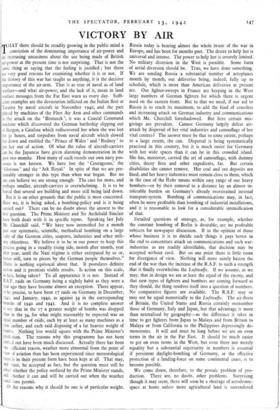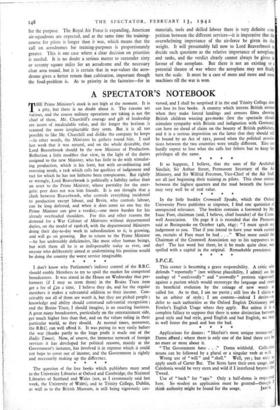VICTORY BY AIR
THAT there should be steadily growing in the public mind a conviction of the dominating importance of air-power and an increasing uneasiness about the use being made of British air-power at the present time is not surprising. That is not the same thing as saying that the feeling is justified ; but there are very good reasons for examining whether it is or not. If the history of this war has taught us anything, it is the decisive importance of the air-arm. That is as true of naval as of land warfare—and what air-power, and the lack of it, mean in land warfare messages from the Far East warn us every day. Suffi- cient examples are the devastation inflicted on the Italian fleet at Taranto by naval aircraft in November 1940, and the part played by machines of the Fleet Air Arm and other commands in the attack on the Bismarck '; it was a Coastal Command machine which discovered the German battleship slipping out of Bergen, a Catalina which rediscovered her when she was lost for 31 hours, and torpedoes from naval aircraft which slowed her down and enabled the .` Prince of Wales' and Rodney' to put her out of action. Of what the value of aircraft-carriers can be the Japanese have given alarming demonstration in the past two months. How many of such vessels our own navy pos- sesses is not known. We have lost the Courageous,' the `Glorious ' and the Ark Royal.' In spite of that we are pre- sumably stronger in this type than when war began. But no one can believe we are strong enough. The case for more, and perhaps smaller, aircraft-carriers is overwhelming. It is to be hoped that several are building and more still being laid down.
But it is on other grounds that the public is most concerned. Have we, it is being asked, a bombing-policy and is it being carried out? There can be no doubt about the answer to the first question. The Prime Minister and Sir Archibald Sinclair have both dealt with it in specific terms. Speaking last July Mr. Churchill said, " We have now intensified for a month past our systematic, scientific, methodical bombing on a large scale of the German cities, seaports, industries and other mili- tary objectives. We believe it to be in our power to keep this process going in a steadily rising tide, month after month, year after year, until the Nazi regime is either extirpated by us or, better still, torn to pieces by the German people themselves." There is nothing equivocal about that. It postulates definite action and it promises visible results. Is action on this scale, in fact, being taken? To all appearance it is not. Instead of R.A.F. raids on Germany being a nightly habit as they were a year ago they have become almost an exception. There appear, to be precise, to have been 17 raids on Germany in December, 1941, and January, 1942, as against 34 in the corresponding months of 1940 and 1941. And it is no complete answer to say that in the 17 a greater weight of bombs was dropped than in the 34, for what might reasonably be expected was an equal number of raids, each by at least as many machines as a Year earlier, and each raid disposing of a far heavier weight of bombs. Nothing less would square with the Prime Minister's prediction. The reasons why this programme has not been carried out have been much discussed. Actually there has been orie '-ufficient reason, weather more abnormal from the point of view of aviation than has been experienced since meteorological records in their present form have been kept at all. That may, and must, be accepted as fact, but the question must still be asked whether the policy outlined by the Prime Minister stands, and whether it can and will be carried out when the weather concL ions permit.
Of the reasons why it should be one is of particular weight. Russia today is bearing almost the whole brunt of the war in Europe, and has been for months past. The desire to help her is universal and intense. The power to help her is severely limited. No military diversion in the West is possible. Some form of aerial diversion should be. True, we have done something. We are sending Russia a substantial number of aeroplanes month by month, our deliveries being, indeed, fully up to schedule, which is more than American deliveries at present are. Our fighter-sweeps in France are keeping in the West large numbers of German fighters for which there is urgent need on the eastern front. But to that we need, if our aid to Russia is to reach its maximum, to add the kind of ceaseless and increasing attack on German industry and communications which Mr. Churchill foreshadowed. But here certain mis- givings are prevalent. Cannot Germany largely defeat air- attack by dispersal of her vital industries and camouflage of her vital centres? The answer must be that to some extent, perhaps to a large extent, she can. Dispersal is being systematically practised in this country, but it is much easier for Germany with her wide spaces than it can be in this crowded island. She has, moreover, carried the art of camouflage, with dummy cities, decoy fires and other expedients, far. But certain disabilities she cannot remove. Her coal and ore deposits are fixed, and her heavy industries must remain close to them, which in the case of the Ruhr means within easy range of our heavy bombers—or by their removal to a distance lay an almost in- tolerable burden on Germany's already overstrained internal transport-system. Bombing of communications may, in fact, often be more profitable than bombing of industrial installations, and it is reasonable to look for a considerable intensification of that.
Detailed questions of strategy, as, for example, whether the constant bombing of Berlin is desirable, are no profitable subjects for newspaper discussion. If in the opinion of those whose business it is to decide such things it pays better in the end to concentrate attack on communications and such war- industries as are readily identifiable, that decision may be accepted without cavil. But on one point there is little room for divergence of view. Nothing will more surely hasten the end of the war than the increase of the R.A.F. to such a strength that it finally overwhelms the Luftwaffe. If we assume, as we may, that in design we are at least the equal of the enemy, and that new types of fighters and bombers are coming forward as they should, the thing resolves itself into a question of numbers. No comparative figures are available. The R.A.F. may or may not be equal numerically to the Luftwaffe. The air-fleets of Britain, the United States and Russia certainly outnumber those of Germany, Italy and Japan, but that advantage is more than neutralised by geography—as the difference it takes in time to get fighters from Japan to Malaya and from Britain to Malaya or from California to the Philippines depressingly de- monstrates. It will and must be long before we are on even terms in the air in the Far East. It should be much easier to get on even terms in the West, but even there not merely equality but a substantial superiority in numbers is essential if persistent daylight-bombing of Germany, or the effective protection of a landing-force on some continental coast, is to become possible.
We come down, therefore, to the prosaic problem of pro- duction. There are, no doubt, other problems. Surprising though it may seem, there will soon be a shortage of aerodrome- space at home unless more agricultural land is surrendered for the purpose. The Royal Air Force is expanding, American air-squadrons are expected, and at the same time the training- course for pilots is longer than it was, which means that the call on aerodromes for training-purposes is proportionately greater. This is one case where a clear decision on priorities is needed. It is no doubt a serious matter to surrender sixty or seventy square miles for an aerodrome and the necessary clear area round, but it is certain that in war-values the aero- drome gives a better return than cultivation, important though the food-problem is. As to priority in the factories—for in materials, tools and skilled labour there is very definite con. petition between the different services—it is imperative that the overwhelming importance of the air-force be given its due weight. It will presumably fall now to Lord Beaverbrook to decide such questions as the relative importance of aeroplanes and tanks, and the verdict clearly cannot always be given is favour of the aeroplane. But there is not an existing or a potential theatre of war where the aeroplane may not finally turn the scale. It must be a case of more and more and more machines till the war is won.



























 Previous page
Previous page